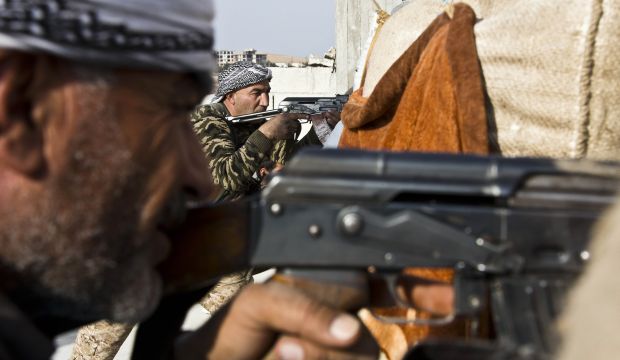
Fighters from the Free Syrian Army (L) and the Kurdish People’s Protection Units (C), join forces to fight ISIS militants in Kobani, Syria, on November 19, 2014 (AP Photo/Jake Simkin, File)
The alliance calling itself the Democratic Forces of Syria includes the Kurdish People’s Protection Unites (YPG) militia and Syrian Arab groups, some of which fought alongside it in a campaign that drove ISIS from wide areas of northern Syria earlier this year.
The Arab groups in the new alliance are operating under the name “The Syrian Arab Coalition” – a grouping which US officials have said would receive support under a new US strategy aimed at fighting ISIS in Syria.
A spokesman for some of the Arab rebels said they were told by Washington that new weapons were being sent to help them launch a joint offensive on the city of Raqqa.
“We met the Americans and this has been approved and we have been told these new arms … are on their way,” said Abu Muazz, a spokesman for the Raqqa Revolutionaries Front, a grouping of mainly Arab tribal insurgents who are mostly drawn from the Raqqa area.
He said the group constituted a 3,200-strong, well trained fighting force which could begin using the weapons within days of their arrival. It has an additional 600 fighters who are currently wounded, he said.
A major offensive against the ultra-hardline ISIS fighters could capture Raqqa in less than two months provided the “right weapons and quantities” arrived, Abu Muazz, himself from the ISIS-held city, said without elaborating.
A US military official has told Reuters that the Syrian Arab Coalition would push down towards Raqqa, ISIS’s de facto capital, while staying east of the Euphrates River.
Keeping the YPG-backed force east of the river could ease Turkish concerns about any further expansion of Kurdish influence in northern Syria. Turkey is worried about the Kurds’ growing power in Syria fueling separatism among its own Kurds.
The United States last week announced a shakeup of its support to Syrian rebels fighting ISIS, effectively ending its program to train fighters outside Syria and focusing instead on providing weapons to groups whose commanders have been US-vetted.
The YPG has to date proved the most effective partner on the ground for US-led airstrikes against ISIS. By deepening ties with groups from Syria’s Arab majority, it could deflect concern among some Arabs that it exists solely to fight for the interests of Kurds.
The YPG drove deep into Raqqa province earlier this year, but stopped short of advancing on ISIS’s de facto capital of Raqqa city, saying it wanted Syrian Arab rebels to lead such an assault.
The new alliance includes the YPG, various Arab groups including Jaysh Al-Thuwwar (Army of Rebels) and the Arab tribal Jaysh Al-Sanadeed, and an Assyrian Christian group, according to a statement announcing its establishment.
“The sensitive stage our country Syria is going through and rapid developments on the military and political front … require that there be a united national military force for all Syrians, joining Kurds, Arabs, Syriacs and other groups,” said the statement, which was sent to Reuters by a YPG spokesman.
“Given that these forces in general are democratic and secular forces that believe to a great degree in diversity, we hope that they will receive support” from the US-led coalition, said Nasir Haj Mansour, an official in the defense ministry of the Kurdish administration in YPG-held territory.
“The current goal in practical terms is to confront Daesh, given that it is the first enemy, but the goal is also to build a democratic Syria in the future,” he said by telephone, using an Arabic acronym for ISIS.
